Ondo is transforming finance through its decentralized protocol, utilizing blockchain to provide institutional-grade products.
I. Project Background and Introduction
BlackRock's CEO Larry Fink believes that tokenization is the future of finance and the next evolution of the market, a stance that may influence the attitudes of other major financial players. As emphasized in our previous research on Dusk Network, Real World Assets (RWA) are becoming an important asset class in the cryptocurrency industry. As of May 2024, the RWA market has exceeded $6.6 billion, reflecting increasing investor interest in this innovative financial product. Tokenizing RWAs and introducing them to the blockchain can provide yield opportunities in DeFi (decentralized finance). The asset tokenization market is expected to reach $10 trillion by 2030.
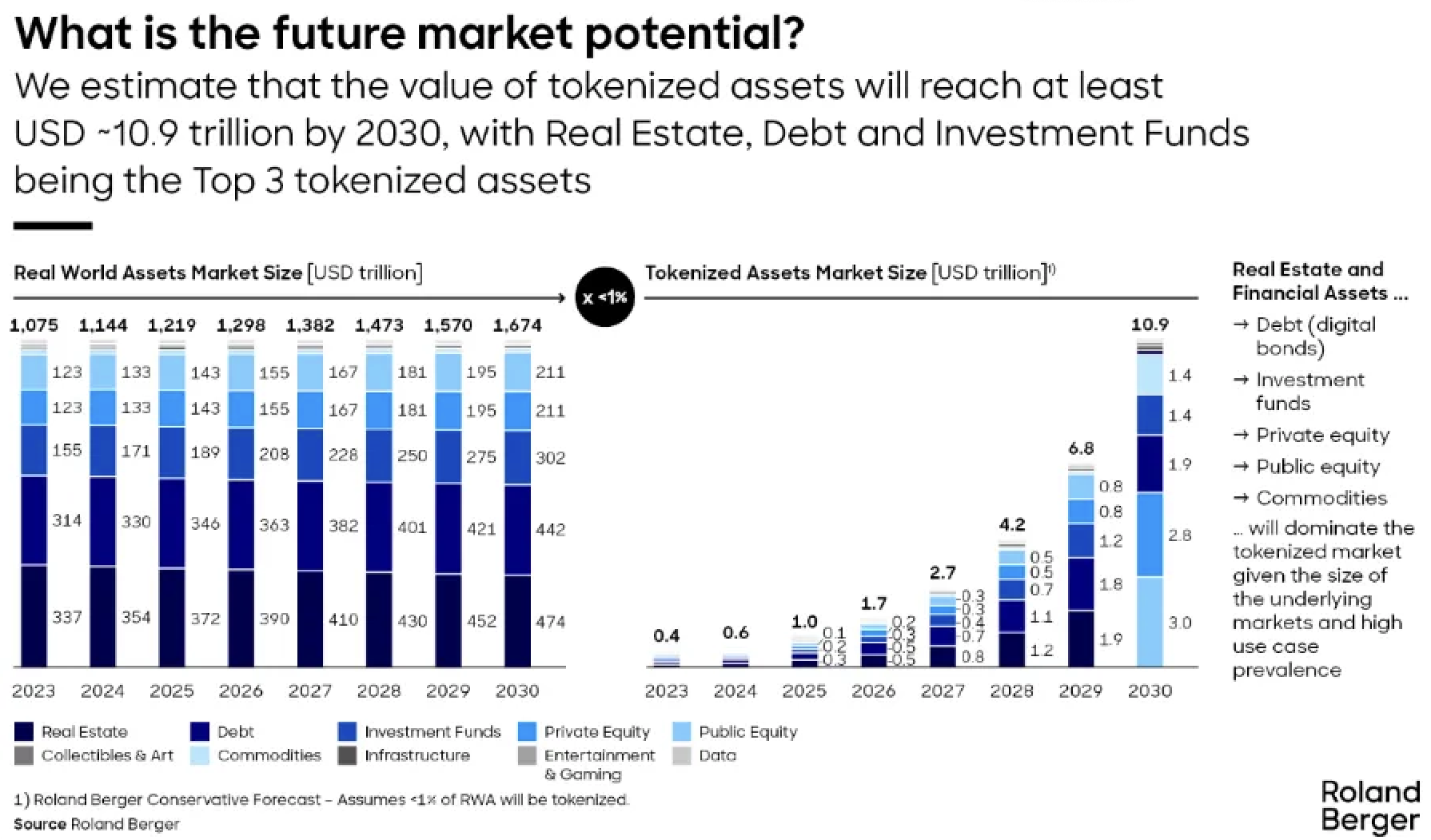
Source: Roland Berge
The primary appeal of this emerging market is not only to provide yield opportunities for DeFi. By digitizing assets into tokens, it achieves asset fractionalization—dividing assets such as government bonds, stocks, and real estate into smaller shares. This process enhances liquidity and opens investment opportunities for investors with different capital levels.
Chainlink explains the operation of asset tokenization with the illustration below. Its main advantages include increasing liquidity and accessibility through interoperable tokenized assets, allowing small investors to invest in high-yield assets with relatively lower capital. Additionally, due to the public nature of many blockchains, it enhances transparency and strengthens composability by connecting the value of real-world assets to the DeFi ecosystem.
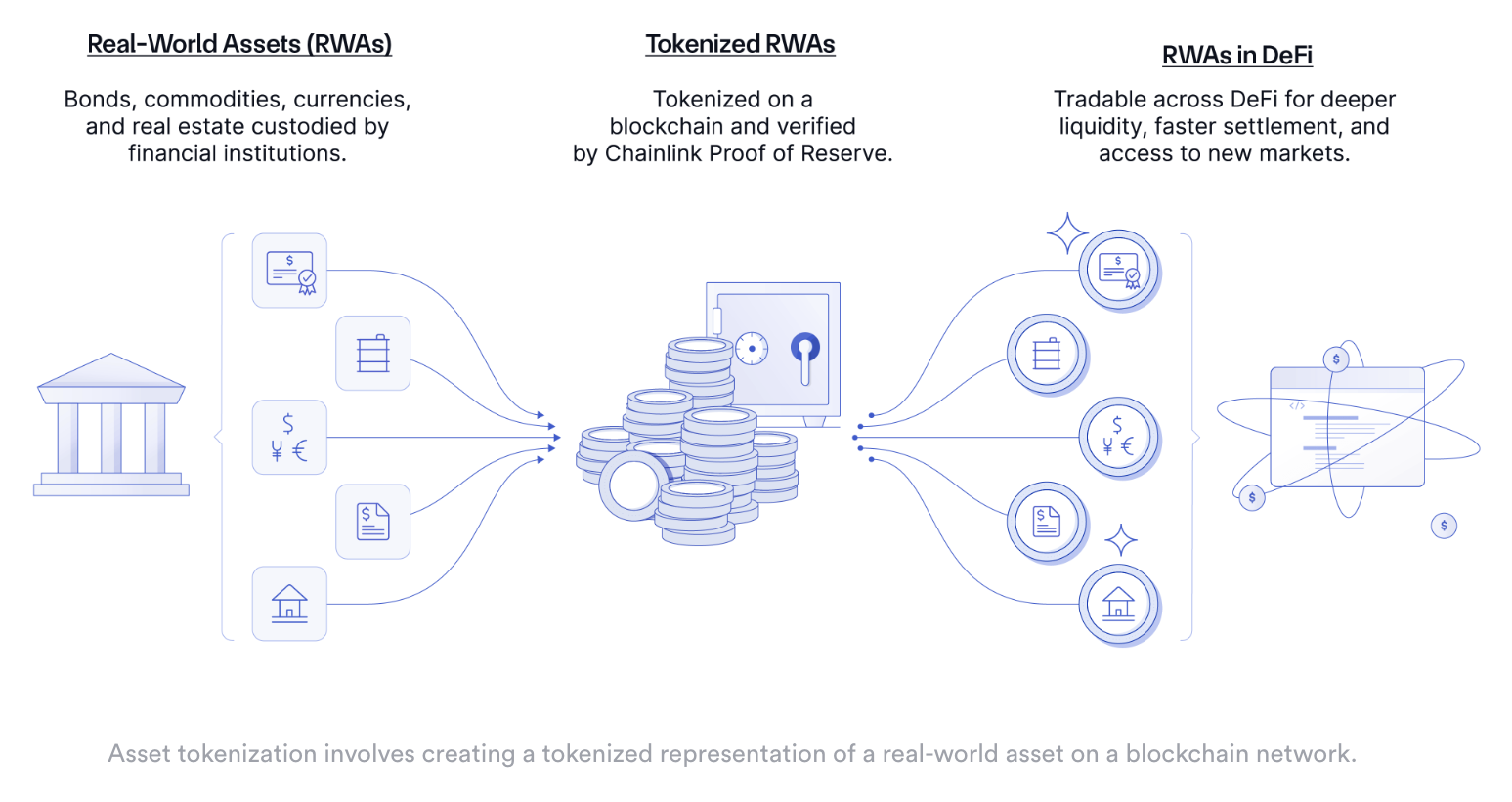
Source: Chainlink
The market value of tokenized US government bonds has also grown from $114 million in 2023 to $845 million, with Franklin Templeton being the largest issuer in this asset class, accounting for approximately 38% of the market. Ernst & Young's (EY) latest research indicates that 64% of high-net-worth investors and 33% of institutional investors plan to increase their investments in tokenized government bonds by the end of 2024.

While still in its early stages, asset tokenization represents one of the most promising and potential applications of blockchain technology. With its government bond tokenization service, Ondo Finance is well positioned in this trend, as investor interest continues to grow.
II. Technical Architecture
Ondo is transforming finance through its decentralized protocol, utilizing blockchain to provide institutional-grade products. By tokenizing stable assets from traditional finance, Ondo combines reliability with the efficiency of blockchain. Ondo has two main departments: asset management and technology. The asset management department creates and supervises tokenized financial products, while the technology department develops protocols to support these products.
Currently, Ondo Finance offers two different investment options:
(1) USDY (Ondo US Dollar Yield Token)
Tokenized notes backed by short-term US government bonds and bank deposits.
Provides an annualized yield rate (APY) of 5.30%, with a total value locked (TVL) of $315.35 million.
Safer and more transparent than traditional stablecoins such as USDT/USDC.
Managed by Ankura Trust Company to ensure compliance and investor protection.
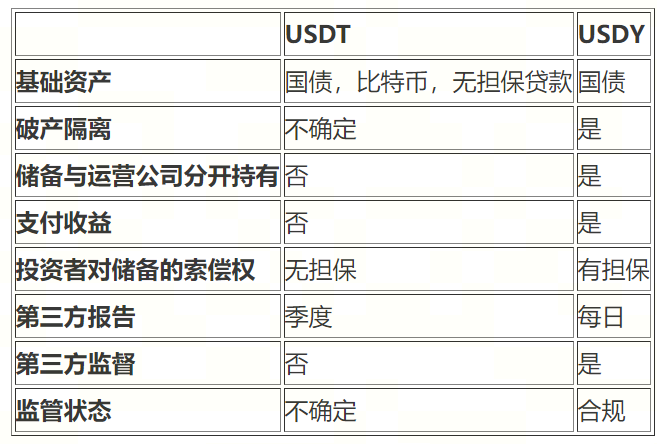
Source: Ondo Finance
(2) OUSG (Ondo Short-Term US Government Bond)
Provides low-risk tokenized short-term US government bonds for passive investors.
Offers an APY of 4.81%, with a TVL of $221.32 million.
Transferred investments from BlackRock's SHV to BUIDL in March 2024.
Ondo recently introduced a new version of OUSG, called rOUSG, to provide additional yield for investors through extra rOUSG tokens.
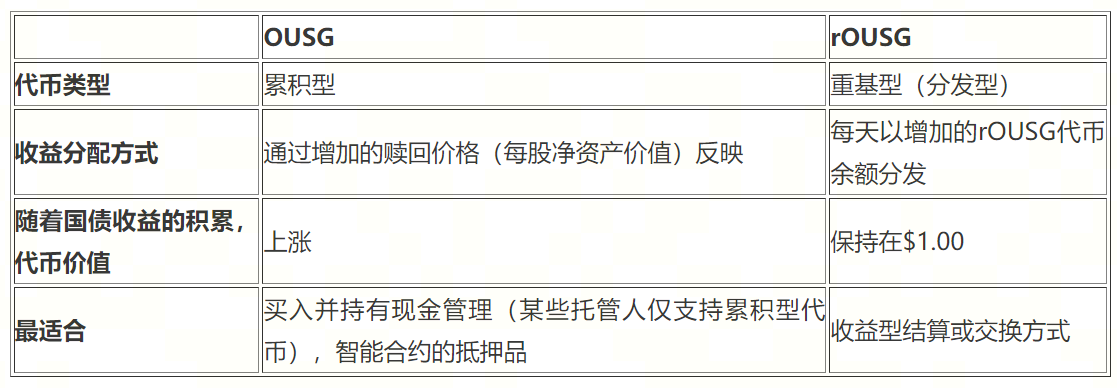
Source: Ondo Finance
III. Products and Development Roadmap
Ondo Finance aims to connect traditional finance and decentralized finance through public blockchain technology. Their focus is on creating secure, transparent, and compliant financial products.
OUSG: Tokenized BlackRock Short-Term US Government Bond ETF.
OMMF: Tokenized BlackRock Money Market Fund.
USDY: Alternative to yield stablecoins.
Flux Finance: Protocol supporting tokenized securities as collateral.
In the next phase, they aim to tokenize publicly traded securities, addressing challenges related to liquidity and infrastructure. Ultimately, Ondo hopes to innovate in traditional finance by extending the advantages of blockchain to a broader range of financial services, using a combination of centralized and decentralized mechanisms. This approach will help bring the advantages of blockchain technology to a wider range of financial operations.
These products have driven significant growth, with Ondo's TVL increasing from $40 million to $534 million. Looking ahead, Ondo plans to expand the use of tokenized cash equivalents by increasing the adoption and liquidity of USDY, OUSG, and OMMF. This will involve establishing partnerships and developing cross-chain tools to facilitate these processes.
Flux Finance, created by the Ondo Finance team, is a significant advancement in decentralized lending. It is based on Compound V2 but includes new features. It supports open tokens such as USDC and restricted tokens such as OUSG (Ondo Short-Term US Government Bond Fund). This means that you can freely lend USDC, but using OUSG as collateral for borrowing requires meeting specific permission requirements to ensure compliance and security. Flux uses a point-to-pool (p2pool) model similar to Compound, allowing users to borrow with over-collateralization. Lenders can earn interest on the stablecoins they provide, while borrowers can use their collateral to borrow stablecoins, following the asset's permission requirements. Flux Finance is governed by Ondo DAO.
IV. Competitive Landscape
With its relationships with giants like BlackRock, Ondo seems to be making a mark in the traditional finance space within the crypto RWA category, complementing other TradFi companies. Competition is intensifying in the decentralized finance field. Centrifuge focuses on tokenizing structured credit and issues debt using NFTs. Ethena provides synthetic asset exposure, allowing users to trade without holding the assets. Maple Finance offers low-collateral loans to institutions, emphasizing credit assessment and lending. Pendle deals with tokenized yield trading, enabling users to separate and trade the yield portion of assets.
Ondo Finance stands out for several reasons. By integrating traditional finance with blockchain and targeting the vast US government bond market, it has broad market coverage. Its complementary approach involves collaborating with traditional financial giants like BlackRock, thereby avoiding direct competition. Additionally, Ondo offers innovative products such as USDY and OUSG, providing safer and more transparent alternatives to traditional stablecoins.
V. Token Economy
(1) Summary of ONDO Token Economics
Market Cap Rank: #54
Fully Diluted Valuation (FDV): $131.5 billion, ranked #16
Circulating Supply: 1.44 billion ONDO (14.27% of total supply)
Total Supply: 10 billion ONDO
Max Supply: 10 billion ONDO
Next Unlock: 1.67 million ONDO (approximately $2.19 million), 5 days later
(2) Token Distribution
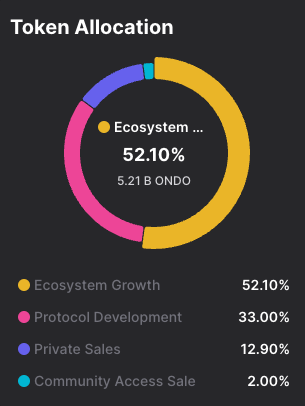
Source: Dropstab
(3) Upcoming Unlock Events
June 18, 2024: 1.67 million ONDO (approximately $2.19 million)
July 18, 2024: 1.67 million ONDO (approximately $2.19 million)
August 18, 2024: 1.67 million ONDO (approximately $2.19 million)
September 18, 2024: 1.67 million ONDO (approximately $2.19 million)
October 18, 2024: 1.67 million ONDO (approximately $2.19 million)
November 18, 2024: 1.67 million ONDO (approximately $2.19 million)
December 18, 2024: 1.67 million ONDO (approximately $2.19 million)
January 18, 2025: 1.94 billion ONDO (approximately $25.5 billion)
January 18, 2026: 1.94 billion ONDO (approximately $25.5 billion)
January 18, 2027: 1.94 billion ONDO (approximately $25.5 billion)
January 18, 2028: 1.94 billion ONDO (approximately $25.5 billion)
(4) Token Utility
The ONDO token is the governance token for Ondo Finance and its Flux Finance protocol. Holders have the right to vote on various proposals within Ondo DAO, ensuring all decisions are transparently made on-chain. To initiate a proposal, an individual must hold or be delegated at least 1 billion ONDO voting power. It is currently unclear whether additional utilities will be introduced for ONDO holders in the future.
VI. Team, Funding History, and Ecosystem
The Ondo Finance team has a diverse mix of personnel from traditional finance and the Web3 space. Co-founder and CEO Nathan Allman and President and COO Justin Schmidt both come from Goldman Sachs. Another key member, Katie Wheeler, comes from BlackRock. Additionally, the team includes developers from OpenSea, MakerDAO, and Boson Protocol. This combination of expertise aligns closely with Ondo Finance's unique vision and goals.
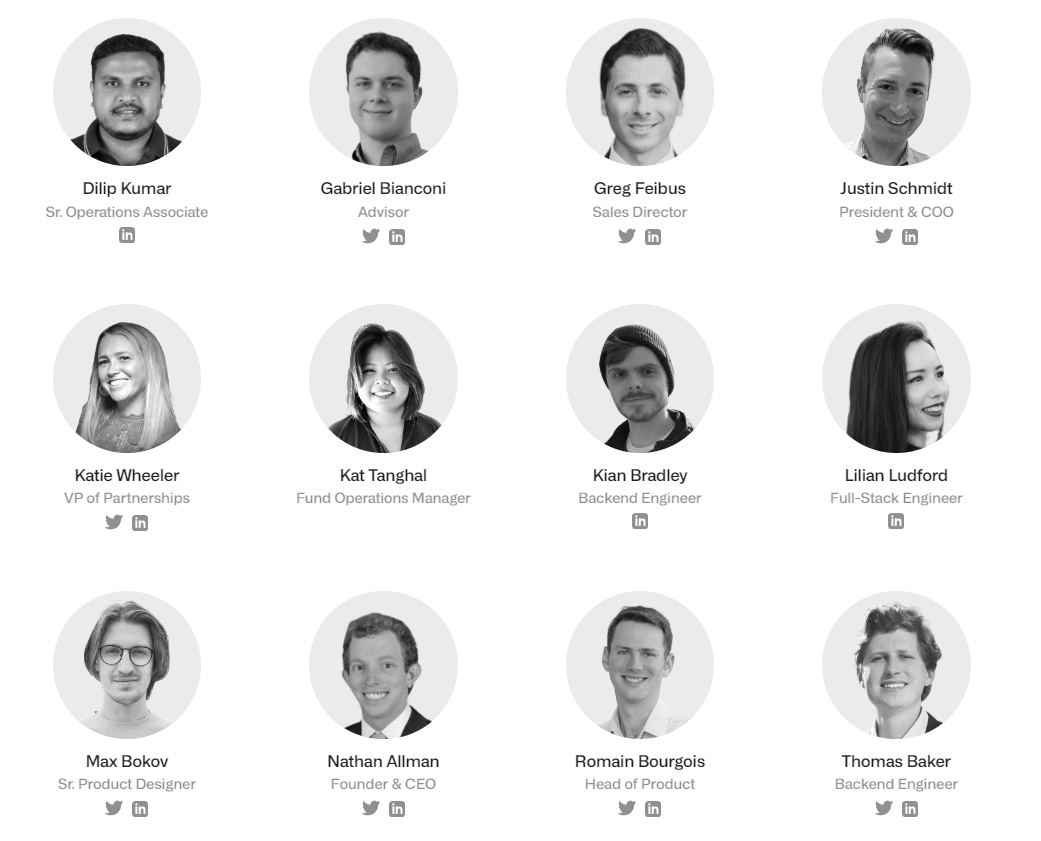
Source: Ondo Finance
Seed Round: In December 2021, Ondo Finance raised $4 million at a price of $0.013 per token, achieving a 99.87x return on investment (ROI). A total of 300 million tokens were sold (3% of total supply), led by Pantera Capital, with a 1-year initial lock-up period followed by a 24-month release period.
Public Sale Round: On May 12, 2022, $10 million was raised at a price of $0.03 per token, achieving a 43.28x ROI. A total of 100 million tokens were sold (1% of total supply) on Coinlist, with a 1-year lock-up period followed by an 18-month release period.
Series A Funding: In April 2022, $20 million was raised at a price of $0.02 per token, achieving a 64.92x ROI. A total of 1 billion tokens were sold (10% of total supply), led by Founders Fund, with a 1-year initial lock-up period followed by a 24-month release period.
Ondo Finance has formed several key partnerships to strengthen its blockchain and financial services:
Aptos Foundation: This collaboration will demonstrate the integration of real-world assets with blockchain technology, starting with the tokenized US government bond product USDY.
Thala Labs: Collaboration to launch USDY for use in Thala's AMM pool and as collateral for collateralized debt positions (CDPs), enhancing liquidity and DeFi solutions.
Wintermute: Collaboration to enhance the liquidity of the USDY stablecoin, providing round-the-clock liquidity across multiple blockchain platforms.
BlackRock: Demonstrates commitment to expanding tokenization efforts and integrating with Ondo products through a $95 million investment in BlackRock's BUIDL fund.
VII. Conclusion
Ondo Finance stands out for several reasons. By integrating traditional finance with blockchain and targeting the vast US government bond market, it has broad market coverage. Its complementary approach involves collaborating with traditional financial giants like BlackRock, thereby avoiding direct competition. Additionally, Ondo offers innovative products such as USDY and OUSG, providing safer and more transparent alternatives to traditional stablecoins.
Bullish Factors:
The tokenization industry is poised for significant growth, and Ondo Finance's collaboration with BlackRock strategically positions it to bring trillions of dollars into Web3.
Ondo Finance's TVL has seen substantial growth since early 2024. Real-world assets represent a fresh and promising narrative in the crypto space, with strong early adoption potential.
Ondo Finance is committed to developing its products to meet customer demand.
Most of the initial investments in OUSG were initially in BlackRock's iShares Short Treasury Bond ETF (SHV). In March 2024, they transitioned to BlackRock's USD Institutional Digital Liquidity Fund (BUIDL), aligning with Ondo's focus on asset tokenization.
Ondo Finance is a leader in the crypto RWA space, becoming the preferred choice.
Ondo Finance holds approximately 38% of the current supply of BUIDL.
Bearish Factors:
The utility of the ONDO token shows significant centralization risk.
While all holders can participate in governance, the largest holders have the most influence.
Approximately 85% of the total ONDO supply is controlled by the Ondo Finance team.
Operating at the intersection of TradFi and cryptocurrency, Ondo Finance enters a relatively undeveloped market, with regulatory challenges posing significant hurdles.
Bad debt is a major risk for DeFi protocols, including Flux by Ondo Finance. Bad debt occurs when the value of a borrower's collateral falls below their debt. If a borrower's equity becomes negative, Flux will use its reserve fund to mitigate losses. To minimize volatility and reduce bad debt risk, Flux only accepts stable assets as collateral.
免责声明:本文章仅代表作者个人观点,不代表本平台的立场和观点。本文章仅供信息分享,不构成对任何人的任何投资建议。用户与作者之间的任何争议,与本平台无关。如网页中刊载的文章或图片涉及侵权,请提供相关的权利证明和身份证明发送邮件到support@aicoin.com,本平台相关工作人员将会进行核查。




